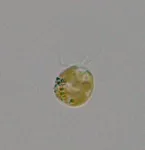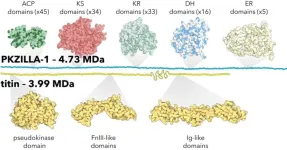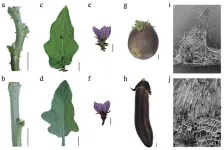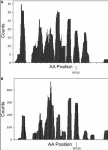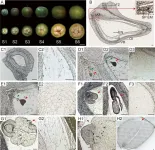The long-lasting impact of war on global diabetes prevalence
How the conflict in Ukraine and linked supply chain disruptions could lead to up to 180,000 additional cases of type 2 diabetes
2024-08-08
(Press-News.org)
[Vienna, August 7 2024] — The ongoing war between Russia and Ukraine has led to severe humanitarian crises, including widespread food shortages. According to the United Nations World Food Programme, an estimated 11 million Ukrainians—about one-third of the population—were at risk of hunger in 2023. This crisis, exacerbated by supply chain disruptions and extreme weather events, could increase diabetes prevalence not only in Ukraine but globally, argue Peter Klimek and Stefan Thurner from the Complexity Science Hub in a commentary published in the journal Science.
Malnutrition during early pregnancy is known to elevate diabetes risk later in life. With 187,000 children born in Ukraine in 2023, Klimek and Thurner suggest that the current diabetes prevalence rate of 7.1% could result in an additional 13,000 to 19,000 cases of diabetes in this birth cohort alone.
Global impact
Globally, the disruption of crucial food exports due to the conflict has pushed an estimated 23 million people into hunger. Considering other supply chain interruptions and weather-related shocks, projections suggest that up to 122 million more people could suffer from hunger compared to 2019. “This could potentially lead to up to 180,000 additional Type 2 diabetes cases worldwide,” the researchers say.
They caution that while these estimates are not intended to be quantitative predictions, they do underscore the profound and often overlooked—especially indirect—effects of geopolitical events on public health.
Ukraine – a key producer
Prior to the war, Ukraine was a major global agricultural producer, ranking as the largest exporter of sunflower oil, the fourth-largest exporter of corn, and the fifth-largest exporter of wheat. The modeled impacts of Ukraine’s agricultural production loss suggest that countries like Moldova, Libya, Lebanon, and Tunisia could face significant wheat shortages, with extensive repercussions for food products that rely on wheat as an ingredient.
Why this matters
Klimek and Thurner emphasize the importance of addressing these indirect consequences of conflicts and supply chain disruptions: "Our estimates are meant to illustrate the scale of the impact on public health, so that health authorities can become aware of these emerging high-risk groups and potentially adjust screening and early prevention measures for the coming decades," the researchers stated. They also stress the urgent need to diversify global food supply chains and reduce dependencies.
Famine and diabetes
The link between hunger and diabetes is well-documented, with studies from historical famines in the Netherlands, China, and Austria, for example, showing that malnutrition during early pregnancy can significantly increase type 2 diabetes risk later in life. Recent research into the Ukrainian famine of 1932-33 by Lumey et al. has provided new insights into this relationship at a more granular level. By analyzing monthly birth cohorts and regional variations in famine severity, they found that severe malnutrition during early pregnancy can increase diabetes risk by 1.5 to 2 times.
This heightened risk is believed to stem from metabolic changes triggered by fetal exposure to poor nutrition, which prepares the body for a nutrient-scarce environment. When this environment changes, the mismatch can result in a higher likelihood of developing diabetes.
About CSH
The Complexity Science Hub (CSH) is Europe’s research center for the study of complex systems. We derive meaning from data from a range of disciplines – economics, medicine, ecology, and the social sciences – as a basis for actionable solutions for a better world. Established in 2015, we have grown to over 70 researchers, driven by the increasing demand to gain a genuine understanding of the networks that underlie society, from healthcare to supply chains. Through our complexity science approaches linking physics, mathematics, and computational modeling with data and network science, we develop the capacity to address today’s and tomorrow’s challenges.
END
ELSE PRESS RELEASES FROM THIS DATE:
2024-08-08
August 8, 2024—(BRONX NY)—A discovery by a three-member Albert Einstein College of Medicine research team may boost the effectiveness of stem-cell transplants, commonly used for patients with cancer, blood disorders, or autoimmune diseases caused by defective stem cells, which produce all the body’s different blood cells. The findings, made in mice, were published today in the journal Science.
“Our research has the potential to improve the success of stem-cell transplants and expand their use,” explained Ulrich Steidl, ...
2024-08-08
While seeking to unravel how marine algae create their chemically complex toxins, scientists at UC San Diego’s Scripps Institution of Oceanography have discovered the largest protein yet identified in biology. Uncovering the biological machinery the algae evolved to make its intricate toxin also revealed previously unknown strategies for assembling chemicals, which could unlock the development of new medicines and materials.
Researchers found the protein, which they named PKZILLA-1, while studying how a type of algae called Prymnesium parvum makes its toxin, which is responsible for massive fish kills.
“This is the Mount Everest of proteins,” ...
2024-08-08
Voids or pores have usually been viewed as fatal flaws that severely degrade a material's mechanical performance and should be eliminated in manufacturing.
However, a research team led by Prof. JIN Haijun from the Institute of Metal Research (IMR) of the Chinese Academy of Sciences has proposed that the presence of voids is not always hazardous. Instead, voids can be beneficial if they are added "properly" to the material.
The team demonstrated that a metal with a large number of nanoscale voids shows improved ...
2024-08-08
Scientists have discovered the gene responsible for prickles in eggplants, a trait that complicates farming. Using advanced genetic techniques, they identified the Prickly Eggplant (PE) gene on chromosome 6 and pinpointed SmLOG1 as the key factor. CRISPR-Cas9 gene editing confirmed that disabling SmLOG1 eliminates prickles, paving the way for prickle-free eggplant varieties. This breakthrough not only sheds light on prickle development but also promises to streamline eggplant cultivation and harvesting, benefiting the agricultural industry.
Eggplants, a staple crop globally, present significant challenges in cultivation and harvesting due to their prickles. These prickles, which serve as ...
2024-08-08
People eat either because they are hungry or for pleasure, even in the absence of hunger. While hunger-driven eating is fundamental for survival, pleasure-driven feeding may accelerate the onset of obesity and associated metabolic disorders. A study published in Nature Metabolism reveals neural circuits in the mouse brain that promote hunger-driven feeding and suppress pleasure-driven eating. The findings open new possibilities for developing strategies to combat obesity.
“Ideal feeding habits would balance eating for necessity and for pleasure, minimizing the latter,” said co-corresponding author Dr. Yong Xu, ...
2024-08-08
“These findings indicate that renalase-1 is a potential antigen for TCR recognition in melanoma and could be considered as a target for immunotherapy.”
BUFFALO, NY- August 8, 2024 – A new research paper was published in Oncotarget's Volume 15 on August 5, 2024, entitled, “Chemical complementarity of tumor resident, T-cell receptor CDR3s and renalase-1 correlates with increased melanoma survival.”
As mentioned in the Abstract of this study, overexpression of the secretory protein renalase-1 negatively impacts the survival of melanoma and pancreatic cancer patients, while inhibition of renalase-1 signaling drives tumor ...
2024-08-08
Key Takeaways
-Fusion has the potential to provide abundant clean energy
-One to two-year awards range from $100,000 to $500,000
In a continuing effort to forge and fund public-private partnerships to accelerate fusion research, the U.S. Department of Energy (DOE) today awarded $4.6 million in 17 awards to U.S. businesses via the Innovation Network for Fusion Energy (INFUSE) program.
The goal of INFUSE is to accelerate fusion energy development in the private sector by reducing impediments to collaboration between business ...
2024-08-08
Following the Mediterranean diet versus the traditional Western diet might make you feel like you’re under less stress, according to new research conducted by a team from Binghamton University, State University of New York.
The findings suggest that people can lower their perception of how much stress they can tolerate by following a Mediterranean diet, said Lina Begdache, associate professor of health and wellness studies.
“Stress is recognized to be a precursor to mental distress, and research, including our own, has demonstrated that the Mediterranean diet lowers ...
2024-08-08
A recent study investigates the intricate mechanisms of sugar import in developing seeds of Camellia oleifera. By identifying key sugar transporters and analyzing their roles, the research provides significant insights into the molecular regulation of seed development. The findings highlight how these transporters, working alongside sucrose-metabolizing enzymes, facilitate efficient sugar import and partitioning. This study not only advances our understanding of seed development in Camellia oleifera but also suggests potential strategies to enhance seed yield and quality in this important ...
2024-08-08
Ann Arbor, August 8, 2024 – Media coverage of shootings by police typically involve urban incidents, giving the impression that the issue is unique to cities. However, national data built from the Gun Violence Archive tells a different story, showing a higher rate of shootings by police in rural and suburban areas than in cities during 2015-2020. A new study in the American Journal of Preventive Medicine, published by Elsevier, reports on the first nationwide, descriptive analysis of where, how often, and under ...
LAST 30 PRESS RELEASES:
[Press-News.org] The long-lasting impact of war on global diabetes prevalence
How the conflict in Ukraine and linked supply chain disruptions could lead to up to 180,000 additional cases of type 2 diabetes


